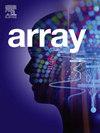A privacy-preserving federated learning framework with graph neural networks for enhanced heart attack risk prediction
IF 4.5
Q2 COMPUTER SCIENCE, THEORY & METHODS
引用次数: 0
Abstract
Cardiovascular disease, a predominant global cause of death, underlines the critical need for sophisticated and privacy-conserving predictive systems for early risk assessment. This paper introduces a novel federated learning (FL) architecture that incorporates graph neural networks (GNNs) to facilitate secure and efficient heart attack risk prediction utilizing decentralized healthcare data. Our methodology generates graph-structured representations from preprocessed client data, dispersed among three clients to maintain data locality and safeguard patient privacy. The GNN models are trained locally, with only the acquired weights transmitted to a central server for secure aggregation. The proposed framework attains a classification accuracy of 96.79 % through comprehensive ablation studies and hyperparameter optimization, exceeding baseline models such as Graph Attention Networks (GAT), 1D Convolutional Neural Networks (1D-CNN), conventional machine learning, and ensemble techniques. Additional validation using an external dataset supports the model's robustness, with an accuracy of 98.77 %. Furthermore, trials conducted on a consolidated dataset demonstrate consistent performance, hence strengthening the framework's generalizability. These findings illustrate the potential of integrating GNNs with federated learning for privacy-preserving, high-performance prediction of heart attack risk in practical healthcare contexts.
基于图神经网络的隐私保护联邦学习框架增强心脏病发作风险预测
心血管疾病是全球主要的死亡原因之一,它强调了对复杂和保护隐私的早期风险评估预测系统的迫切需要。本文介绍了一种新的联邦学习(FL)架构,该架构结合了图神经网络(gnn),以利用分散的医疗保健数据促进安全有效的心脏病发作风险预测。我们的方法从预处理的客户数据生成图形结构的表示,分散在三个客户中,以保持数据的局部性和保护患者隐私。GNN模型在本地训练,只将获得的权值传输到中央服务器进行安全聚合。通过综合烧烧研究和超参数优化,该框架的分类准确率达到96.79%,超过了图注意网络(GAT)、一维卷积神经网络(1D- cnn)、传统机器学习和集成技术等基线模型。使用外部数据集的额外验证支持模型的鲁棒性,准确率为98.77%。此外,在统一数据集上进行的试验显示出一致的性能,从而加强了框架的泛化性。这些发现说明了将gnn与联邦学习结合起来,在实际医疗环境中实现隐私保护和心脏病发作风险的高性能预测的潜力。
本文章由计算机程序翻译,如有差异,请以英文原文为准。
求助全文
约1分钟内获得全文
求助全文

 求助内容:
求助内容: 应助结果提醒方式:
应助结果提醒方式:


